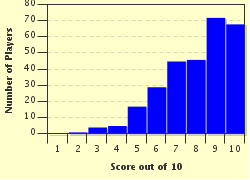Quiz Answer Key and Fun Facts
1. September 12, 490 BC. "Pheidippides, run as fast as you can and take the joyous message of victory to our brethren in Athens". The order was given by General Miltiades after which famous battle?
2. July 21, 356 BC. "It's a boy, Your Highness. Queen Olympias has given birth to a healthy boy. You can see them both as soon as we clean them up". The message was delivered by one of the midwives to the king. What was the name of the boy?
3. March 15, 44 BC. "Come on Brutus. Finish Him off. Rome does not need dictators." Who was assassinated in the Roman Senate?
4. May 11, 330 AD. "From now on this city, New Rome, will be the seat of the Empire". Thus spoke the Roman Emperor at the dedication ceremony of the new city. By what name was the city better known as?
5. December 25, 800 AD. "By the power invested in me by the Holy Church I crown you Emperor". Who was crowned by the Pope Leo III?
6. 14 October 1066 AD "Great shot man! You got him straight in the eye." That could have been said during which battle?
7. 15 June 1215 AD. "Sire, you have a lot of signing to do because copies of the document must be sent to all officials in the country". King John was forced to sign the "Great Charter "by the rebel barons in Runnymede. What was Runnymede?
8. 29 May 1453 AD. "The city is fallen and I am still alive" are the last words of the last Emperor of the Eastern Roman Empire. What was his name?
9. 3 August 1492 AD. "Today we embark on a journey to discover a new route to India and China, thanks to the generosity and support of the King and Queen". To what King and Queen was Christopher Columbus referring?
10. 14 July 1789 AD. "Is it a revolt?" "No sire, it's not a revolt; it's a revolution." To whom did the Duke Rochefoucauld-Liancourt give that reply?
Source: Author
gme24
This quiz was reviewed by FunTrivia editor
bloomsby before going online.
Any errors found in FunTrivia content are routinely corrected through our feedback system.


